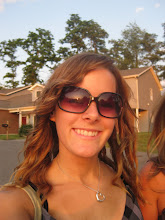
We talked about it already in our meeting on Monday but I will tell the story again so I can come back to it in awhile and relearn what I learned this past week.
Travel week was nothing short of phenomenal. It is amazing what happens when you take 19 college kids and bring them to a new place for 5 days (with no internet or cell phone service).
Life became about the people next to us, not the next thing on our to-do lists. For a few days we lost track of Facebook notifications and friends back home and bonded like never before.
There is something about being in a place different from 'home base' that is good for the soul, both individually and collectively. We shared experiences unique to our group and spent time in places where we felt like no one else had ever been - our own little secret memories. Words and photos just don't do the places justice.
First, a long hike on "The Road to Nowhere," where Forney Creek meets Fontana Lake. The dynamic of the hike was to walk a little ways having a one-on-one conversation, naturally lose track of you companion through some sort of casual change in pace, then start a one-on-one with someone else. A few times there were groups of 3 or 4 having conversations but again those dynamics naturally changed as someone picked up their pace or stopped for a drink of water. I think the subconscious knowledge that we would have another 4 days together after that day helped to keep the conversation easy - we could talk about things and not be feeling like every topic had to be concluded or packaged with a nice little bow. We could release thoughts and let them linger in the silence without needed concrete answers or solutions to the issues we faced.
Friday we got a glimpse of the scale of the forest. We started with a hike through Joyce Kilmer Memorial Forest, a patch of land with trees that are hundreds of years old and were spared from the logging industry in the late 1800s and early 1900s. There were poplars that were 8' in diameter. This hike was quieter and more introspective as I just thought about how long those trees had been sitting there, growing and growing and growing. It was unfathomable to picture winter after winter, summer after summer, those trees growing and thriving; their roots winding throughout the ferns and vines on the forest floor. It reminded me to have patience in my circumstances - that just waiting a few more days or a few more weeks doesn't have to be painful or miserable - it can actually be healing. A later hike to the Wesser Bald fire tower (with a 360 degree view of the mountains) reminded me again how very very small I am in the grand scheme of things. I wasn't discouraged by this, but just humbled and put in my place a little bit. The selfishness dissipated and I became more aware of the fact that the world truly doesn't revolve around me.
Saturday was a continuation of the miracle of group dynamics. There were no cliques, no one left out, just an overwhelming feeling of acceptance, humility, and belonging. I wish there were words adequate to describe the way acquaintances became friends - it was like the time warp thing you've talked about - where time goes slower and faster and somehow in a matter of days you have all these best friends and you feel like you've known them much longer than you actually have.
I think the success of the trip was a combination of factors:
-Being in a place other than our context, we were unfamiliar with our environment and so we learned about it together
-All of us went into the trip open to experience new things and get to know people
-We went in with a willingness to step outside of our comfort zones and truly explore - talking with locals to find the answers to the questions we had
-We shared seats and beds and water bottles and snacks and hairbrushes and shampoo and stories and memories and fears and failures and goals and hopes and experiences
-No one in the group found the need/desire to drink alcohol - we were too busy/exhausted having fun to even want to party
-The experiences we were sharing were unique to the trip - it was a combination of once in a lifetime experiences
-There were lots of firsts: first hikes, first time wake boarding, first time jumping off the roof of a houseboat into the lake, first time taking site measurements, etc
-Not only did we learn about a new area, but we learned how to practice a new way of seeing the world and absorbing it more fully than ever before.
-The trip was full of genuine affirmation and encouragement. Ugly words weren't spoken. Period.
I wish I knew more about how to put into words the moments of magic on this trip. I just felt so fortunate to have been a part of it and to begin to look into how I as a leader and as an architect can begin to create those same types of experiences for others in the future.
